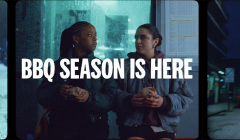
KFC prepares for British BBQ weather
The summer campaign for KFC’s Ultimate BBQ Burger readies Britain for rainy BBQs

Disconnected customer experience is a key challenge for brands, according to research from Digitas UK.

In a world in which technology means consumers are more connected than ever, the irony is individuals feel more disconnected than ever before. A trend which has significant implications for brands. Research from Digitas UK showed than nine out of every 10 people in the UK agreed that we are more disconnected as a society than ever before.
For brands this growing sense of disconnection is manifesting itself as a myriad of cross-platform friction points with consumers. For despite the growing conversation about the importance of the experience economy for consumers, the fact remains that truly connected customer journeys are still the exception.
Matt Holt, UK Chief Strategy Officer at Digitas UK, outlined this challenge at an event designed to tackle this ‘Experience Problem.’ He explained, “That disconnection is also seen in businesses as they struggle with silos, meaning the customer experience is often disconnected.” This is a particular friction point for brands, according to Holt, as “people are demanding connected experiences like never before”.
Despite the growing conversation surrounding the opportunity afforded to brands by the experience economy, Digitas research shows that 81% of consumers agree that brands are not making meaningful connections.
A panel hosted by Dave Lowe, Strategy Partner at Digitas UK, explored the challenges created by silos which are effectively preventing marketers from delivering truly connected customer experiences. To address these challenges, the agency has launched a new experience model which includes a total of nine dimensions that contribute to a connected customer experience for customers.
By viewing their consumers’ world through the lens of their individual business silos, rather than a true understanding of the complexities of consumers’ lives, brands are falling short. Gillian Tett, author of The Silo Effect, explained, “Often the things we focus on as suppliers of services are our own sense of ordering the world. We often lose track of what consumers want, and the way they think.”
She added, “We have to spend time immersing ourselves as anthropologists, as listeners, and understand what consumers want. Take Airbnb; is it actually providing what consumers want? Are hotels? Finding the answers requires listening and taking away our preconceptions.”
How brands overcome silos was another key challenge that was addressed by the panel. Digitas’ Holt explained, “We place so much emphasis on the importance of skillsets. There’s generalism and specialism in the industry but often we go into a channel too soon, rather than understanding the customer and the research.”
He explained that a shift needs to take place if brands are going to improve experiences; that starts with taking a step back. “Understand the problem you’re trying to solve and then the channels tend to work themselves out,” he added.
Christina Purnell, Senior Director of Performance Marketing at Marriot International, explained the way in which the hotel brand delivers a connected customer experience: “At Marriott, we have a great website and state-of-the-art app, but if we don’t follow through or deliver on service at the property level, then we’re dead in the water”.
Purnell shared the simple behaviours that drive a connected approach to marketing at the hotel brand. For example, performance marketing sits at the same table as the head of room operations and services, which makes the media and platform discussions naturally joined up with customer services.
We have to spend time immersing ourselves as anthropologists, as listeners, and understand what consumers want.
Gillian Tett
The importance of breaking through the marketing bubble and seeing the world through the eyes of your consumer also topped the agenda. Marriot International’s Purnell, said, “Going out and looking at things as the consumer sounds so simple, but bringing people in who never would have thought in the same way, and having the right people across all disciplines at the table from the start, is so important.”
Tett added, “We need to think ourselves into [the] minds of others, spend a week or a day in another company, talk to someone in a different industry, read yourself online into someone else’s business. For a week, put 20 people in your social media feed that are completely different people from your worldview. Then look back on yourself.”
Yet, while getting into your consumer mindset may sound obvious, the challenges of doing so in the midst of the seemingly never-ending demands on marketers was also addressed by the panel. As Tett explained, “There’s now so much emphasis on being ultra-efficient, it’s hard to defend the idea of having some slack, in order to roam and understand the issue as an outsider. We all need some slack to explore.”
Lowe added, “I like the idea of slack, but use it to get into the minds of your customers, and in your organisations by talking to people from different departments.” For it is only by breaking our own silos and seeing the world through a lens other than our own, that marketers can build meaningful connections with consumers.
Looks like you need to create a Creativebrief account to perform this action.
Create account Sign inLooks like you need to create a Creativebrief account to perform this action.
Create account Sign in